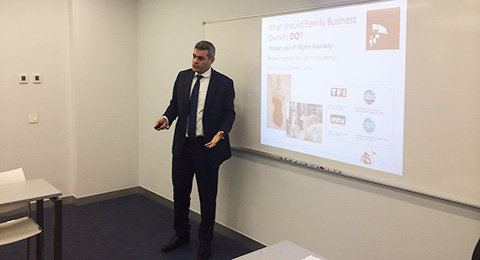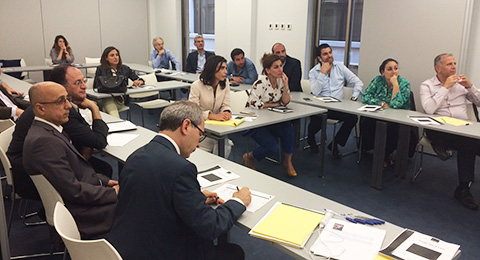Exploring the Subject of Intellectual Property
A legal perspective of intellectual property in family businesses.

On June 2, 2015 the Family Business Network of IFEB organized a workshop presentation entitled “Intellectual Property in Family Businesses: Challenges and Lessons for Continuity” at the LAU Executive Center, where speaker Mr. Rany Sader clarified notions related to intellectual property (IP) in general and for family businesses in particular.
Sader, co-founder and managing partner of Sader and Associates, began by defining intellectual property – the result of one’s ideas and creativity – and continued by confirming the complexity of the subject identifying the different facets of intellectual property – patents, trademarks, copyrights. He also identified the main business assets – intellectual property rights and soft IP.
“Intellectual property rights are protected by Law and represent intangible rights” as Sader presented. They included copyright, patents, trademarks and trade names as well as industrial designs.
Soft IP, as the name insinuated “are a category of rights that are not protected by law, but still represent intangible rights which are often associated with the IP rights” as stated by Sader. These included trade secrets, know-how and confidential information, and Sader explained each type, revealing their relative holders, businesses and industries.
Soft IP in particular entailed measures to protect holders from fraudulent acts; legal measures would be the penal code for fraudulent competition, IP Law for unfair competition, COC for contractual responsibility and Article 47 for patent law. Other measures consisted of internal actions to protect confidential information in companies, like keeping documents/files in a bank or secured office, employee awareness and policy manuals, among others.

Additional issues explored by Sader included copying and its legal boundaries, as well as the barriers between stealing and creating. What was particularly attention-grabbing to attendees was the section about family businesses, considering the audience was part of the Family Business Network. In this section, Sader put forward family business facts, gave examples of famous international and local brands and presented case studies of some of the most note-worthy names in the business world.
Sader also elaborated on his own family business by explaining its heritage, evolution and the type of activities that required copyrighting namely legal publications, and discussed branding and trademarks for family business names, their legal implications and the limits to registering surnames.
Sader concluded by proposing ways for family businesses to protect their IP and avoid any complications related to it. Some of the suggested on the internal level were to build rights and give importance to ideas from creation to execution, and also to seek originality and be unique by avoiding generic terms. Some of the external ways suggested would be to register trademarks, prove copyrights, and use non-disclosure as well as clear licensing agreements.
Why is IP important?
Without IP creativity would be jeopardized and companies would start to disappear as Sader exclaimed; and there was another reason, as per Sader, quoting Steve Jobs:
“It is wrong to steal. It hurts other people and it hurts your own character” (Steve Jobs by Walter Isaacson, 2011).